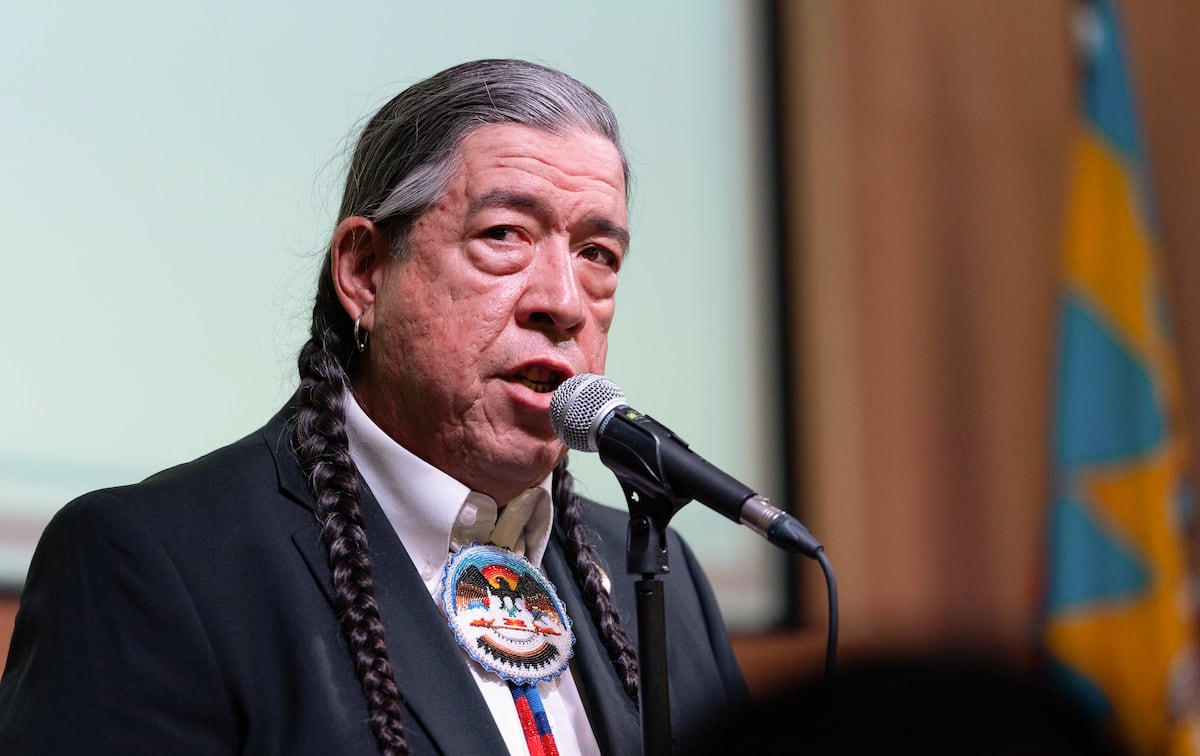“We are keen on keeping nature on the reservation the way it should be,” said Ute Chairman Shaun Chapoose.
(Francisco Kjolseth | The Salt Lake Tribune) Shaun Chapoose, chairman of the Ute Indian Tribe, is seen speaking in this photo from Friday, Aug. 6, 2021. Chapoose and the tribe’s Business Committee have voted to remove the ban on nonmembers accessing certain recreation permits for tribal lands.
After more than a year of banning outsiders from recreating on its lands, the Ute Indian Tribe of Utah is now starting to lift some of its restrictions.
The tribe’s governing Business Committee has moved to allow non-tribal members to once again purchase fishing, camping and boating permits for the reservation. At this point, the ban on nonmembers getting hunting permits remains in place.
An employee at the Ute Tribe Fish and Wildlife Department said last week, “We’re still working that one out.”
All recreation permits for outsiders were originally suspended in January 2024 — and marked a rare step by the tribe’s governance, appearing to be the first time it has taken such large-scale action. Ute leaders said then that nonmembers were violating the rules of the Uintah and Ouray Reservation that sits in the eastern corner of the state.
At the time, then-Ute Chairman Julius T. Murray III, who is now a member of the Business Committee, said they were leaving trash behind at campsites. And nonmembers were also using all-terrain vehicles on reservation lands, which is strictly forbidden.
He said those “disrespectful violations” left the tribe with no choice but to terminate all recreation permits for nonmembers.
The ban was in place for about 18 months before the Business Committee voted to lift it at the end of July and issued a formal resolution on that last week.
Newly elected Chairman Shaun Chapoose told The Salt Lake Tribune that the tribe will still closely monitor activity from permit holders to make sure the rules are being followed — which are spelled out in a 25-page document. For fishing, for instance, that includes no outsider access to Desolation Canyon.
The prices for the permits — which are sold at Ute Plaza and Ute Petroleum convenience stores in Uintah and Duchesne Counties — vary depending on age and whether someone purchases either a daily or an annual pass (running from $15 to $55). The tribe uses the money collected from the nonmember permits to fund conservation projects on the reservation. That includes running a fish hatchery.
(Rick Bowmer | AP) Delanna Mart stands on a dock at a lake on Ute Indian Tribe of the Uintah and Ouray Reservation, Monday, July 25, 2022, in Fort Duchesne.
Chapoose said the tribe has been working to restore native cutthroats in its waterways.
“Natives, they were environmentalists starting a long time ago,” he said. “We are keen on keeping nature on the reservation the way it should be.”
For hunting, Chapoose said, there have been issues with nonmembers poaching trophy animals on the tribe’s lands. There have also been instances of hunters illegally trying to push big game off the reservation so they can shoot it.
It’s not clear yet, he said, how or if the Business Committee will resolve those concerns.
The tribe’s Uintah and Ouray Reservation covers 4.5 million acres in the Uinta Basin and is the second largest Native reservation in the country. The land is under the sovereign jurisdiction of the tribe, which can choose to limit access for any reason.
On Facebook, one tribal member wrote on the announcement to restore some permits: “Keep our grounds clean. It is a privilege for others to enjoy our reservation.”

